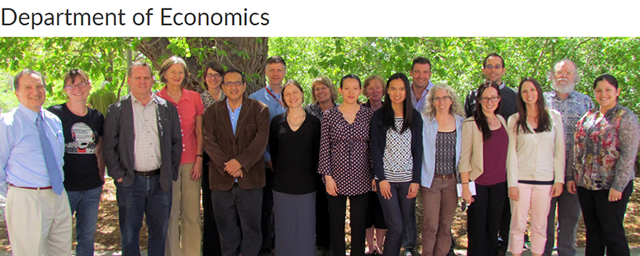
Economics ETDs
Publication Date
Fall 11-15-2021
Abstract
The first essay: Agriculture in Nepal is the most critical sector for economic growth – it directly benefits the poor, and a considerable proportion of the population derives their livelihoods from agriculture. This essay uses the 2017–2018 baseline survey data from Nepal Seed and Fertilizer (NSAF) project funded through the USAID’s “Feed the Future” program. The essay explores a causal relationship between agronomical knowledge and productivity-enhancing farming decisions. Evidence indicates that there are significant, consistent, and positive returns to agronomical knowledge via engaging in advisory contact through traditional agricultural extension. Given the drawback of the institutional irregularity of advisory services, the essay proposes a modern approach aiming at environmental sustainability and resiliency – such as, silicon valley solutions, e.g., a two-way IVR advisory system, can be initiated.
The second essay: Being from backward castes or classes, as well as being a Muslim, in India is associated with institutional discrimination that has economic costs. Using the 2011–2012 National Sample Survey data, this essay identifies that caste and religion still rule the modern Indian labor market. Results indicate that discrimination is evident in socio-religious earnings gaps. A recent ongoing debate is whether or not to incorporate caste as an identity in global development policies in addition to gender, race, and religion. When castes are inherited identities and mutually exclusive, they can play a significant role in shaping life opportunities. This research suggests that we need to take caste and religious discrimination seriously and address the inequality problem through the Sustainable Development Goals.
The third essay: This essay explores the possible linkages between dotal (dowry-paying) heterosexual marriages and women’s educational attainment in India. It adopts an implicit market for marriages and formulates an intra-household mechanism of human capital investment. Using data from the 2006–2009 Rural Economic and Demographic Survey and the 2011–2012 India Human Development Survey, this essay examines the contesting theories of how dowry may affect the educational attainment of women. This essay discusses the role of legislative reforms at the individual and the local government level as well. Evidence from the essay suggests that some policies may not achieve the desired goals but can collect a few debris on the way to a more gender-progressive society.
Degree Name
Economics
Level of Degree
Doctoral
Department Name
Department of Economics
First Committee Member (Chair)
Alok K. Bohara
Second Committee Member
Xiaoxue Li
Third Committee Member
Richard Santos
Fourth Committee Member
Achin Chakraborty
Fifth Committee Member
Wendy L. Hansen
Language
English
Keywords
human capital, agronomical knowledge, caste, religion, marriage market, dowry
Document Type
Dissertation
Recommended Citation
Chakraborty, Soumyajit. "Essays on Human Capital." (2021). https://digitalrepository.unm.edu/econ_etds/127


